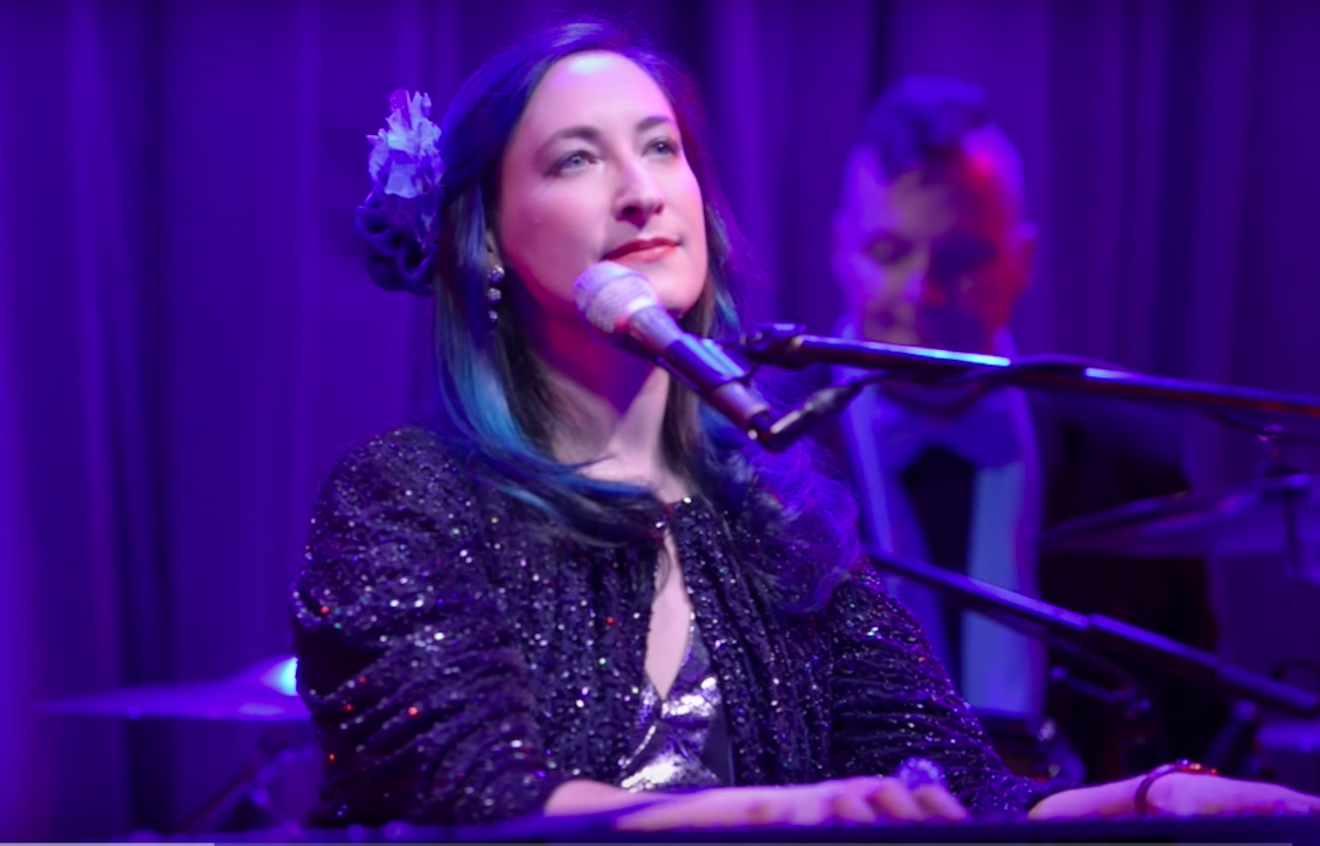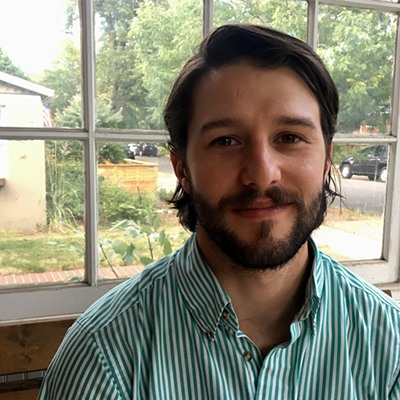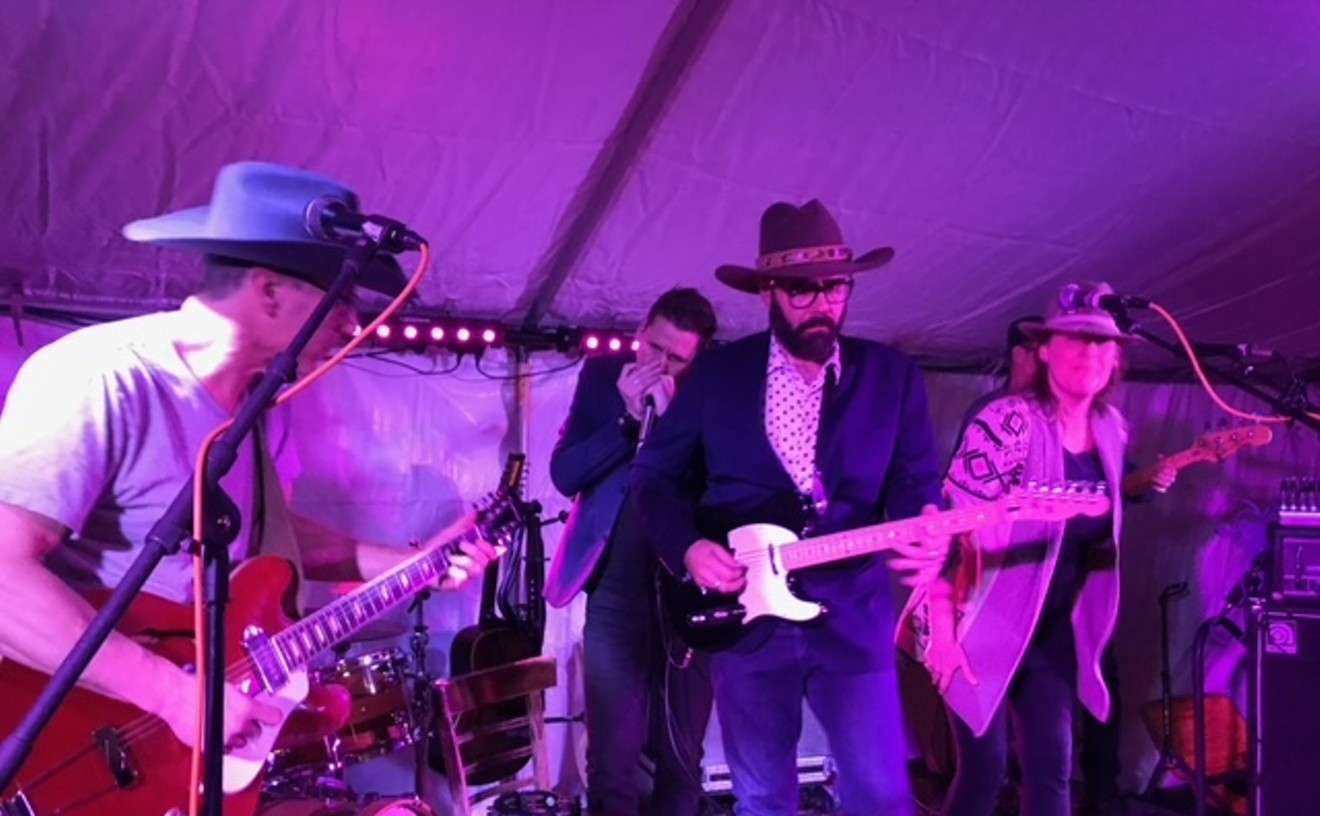Ahead of her Denver concert, Sage chatted with Westword about her earliest days as a musician, her soon-to-drop record, stuffed mushrooms, and what it's like to be stuck on a plane with coughing people.
Westword: I looked through your tour dates and saw that you’ll hit up some really good food spots. That’s the first thing I think of when looking at a list of places.
Rachael Sage: It is all about the food.
Is there a go-to when you’re on the road? Is there a specific place you love hitting up?
I love that we’re starting with food. After my own heart. I love San Francisco, because it’s kind of like New York: It’s very diverse, and you can get any kind of ethnic food. I did Japanese food while I was there recently, but every place has its own pockets of culinary excitement.
When I’m in L.A., I actually stay at a hotel that’s adjoining a terrific diner. As unassuming as it sounds, I look forward to their eggs over easy with a side of avocado for weeks.
That sounds great.
We’re pretty healthy. We love clean food that has great flavor and is vegetarian-friendly. Backstage there’s always nice stuff from each venue. Everyone does it a little bit differently. In Whittier, California, the local presenter made us stuffed mushrooms with quinoa, and it was so yummy. We were like, "How do we make this?”
Stuffed mushrooms with quinoa sounds wonderful.
Anything you’d recommend along the route?
I saw that you’re going to stop in San Antonio after Denver, which is where I grew up. I’m going to be honest: The food there is good, but not good for you.
The big thing there is barbecue, right?
The Tex-Mex there — the enchiladas. That’s what always calls back to me.
[Laughs] I see.
Have you been able to avoid getting sick while on the road?
It’s funny you should ask that, because I tweeted last night from the first plane connection I had that every single person on the plane seemed to be coughing. I tweeted "#get me out of here, #emergency," and I got all these people writing back with recommendation things I could do like wear a scarf over my face and take Airborne. It was a very interactive thread.
You don’t want to put a hex on it, of course, or as we say in Yiddish, the Kenahora, and I’m wearing my Evil Eye. But you know, so far so good. You have to keep your immune system up, exercising, eating healthy. There’s only so much you can do, though; if the universe wants you to get sick, you’re probably going to get sick.
And I imagine after touring for, I don’t know, twenty-something years at this point, you’ve probably learned to toughen up a little bit.
True. I take [Source Naturals] Wellness Formula. I don’t know if you’ve heard of that, but it’s awesome. I feel like I should be a spokesperson for them. I buy it at Whole Foods, and I take it with me on the tour. You take three a day, and at the first signs of “imbalance” — I love their holistic language — then you take more of them. It’s just antioxidants, all that good stuff.
I’m so not rock-and-roll. Everybody along the tour on the West Coast was coming up to me personally, all these individuals, and asking, “Do you want to get high?” I’m from New York. People don’t ask you that [laughs]. It’s very strange. I was like, "No, thank you, but have a lovely evening!"

Rachael Sage performing "The Tide" at Sessions in the House in Ireland, 2017.
https://www.youtube.com/watch?v=lKworvGBRrU
I’m so excited. As we speak, I have the preview of the artwork up on my iPad, so it’s accompanying our call. It is— I hope that it is my best album yet. It really feels like a culmination of a lot of live touring that I did where I showed some of these songs this past year. I debuted the title song “Myopia” last fall in England, and it seemed to become an audience favorite really quickly, which was an indicator to me to put that damn song on the record.
In this case, I ended up building an entire album around that theme of vision, lack of vision, narrow-mindedness and insight, and anything to do with eyes and anything visual, which is something I’ve always been obsessed with in general. As someone who wears contact lenses and is extremely myopic, suddenly that word became quite a timely metaphor, unfortunately, for a lot of what’s going on socio-politically, and it was just very rich fodder for a songwriter like myself. That’s the thrust of the theme, and I’m kind of coming at the concept from every angle that I could.
You’ve released, what, thirteen albums to date?
This will be my thirteenth, yeah, and a handful of other EPs and other stuff. I try not to count, and then suddenly you’re writing your own bio, and then you realize maybe you should count.
Does making a record get easier at any point?
Oh, what a good question. I love making records. I’m a producer, and if I had three of me, I would love to also produce other artists. Hopefully, someday I will, but I love performing, too, so that’d be tough to squeeze all that in.
For me, personally, recording is like painting, and it really is this sense of creating a collage of sound. I’ve been doing it since I was roughly thirteen years old, when I got my first four-track. That was a more natural environment for me initially than performing as a singer-songwriter, because that’s what I started doing first. I was always sitting at the piano playing for people, but once I started singing, I was actually recording more than performing live through my teens and into college. It’s very natural for me; I truly love it. And I try to take advantage of the studio environment to do things that I wouldn’t do live.
I think it’s a great way to feel safe and try things you wouldn’t necessarily in a live situation, and also to use the technology in a creative way.
It sounds like there’s this common thread among artists where the process of creating something is what gets them into being an artist in the first place, and then actually making something is the next step.
Yes and no. I love that process, but the songs are already written when I go into the studio. I’m not really one
of those people, with a notable exception, where I’m writing in the studio. That’s amazing. I’m sure I could do that, but hopefully it’d be off the clock, where I’m not paying the studio by the hour. I did do one song like that off the new record, where I literally wrote the lyrics seconds before I sang it a cappella and then built a track around it, but that was kind of unique and exciting, because I don’t usually do that.
The songwriting develops on tour or at home, and I become excited to go into the studio to create the recordings once I know that I have songs that I really feel strongly about and believe in.
The actual songwriting is something that you started doing at a young age. Did you just decide to do that? Did someone challenge you to try it?
I had a piano in my living room growing up, and I had two parents who were not musical, but they were very appreciative of music. They were bringing their kids to off-Broadway and to local community theater. I remember being taken to an Israeli folk-music show when I was like five years old, and I came home and played all the melodies on the piano. My parents looked at me like I was from Mars [laughs]. They were like, "Who is this kid? Where did she get it from, and what do we do now?”
The same thing happened when they took me to see Oklahoma!, Annie, and all these shows on Broadway. I wasn’t playing them perfectly or like Mozart, but I was clearly developing an ear and was playing with both hands, and they could identify the melodies. They were scratching their heads, confused with what to do with me.
What ultimately happened was I started absorbing all the music I was hearing in my ballet class, listening to the Top 40, the theatrical show music my mom played, the doo-wop music my dad was playing in the car on the way to school — and all of it melded into this sort of soup of inspiration and a lexicon of melody that influenced my own songwriting.
By the time I was five, I was sitting at the piano, writing songs about things that I cared about — like my best friend, Jenny — and I would make up songs that sometimes emulated lyrics in songs that I had heard on the radio. Of course, I had no idea what they meant! Like "making love": I didn’t know what that meant. I was hearing Air Supply writing about these adult themes, and my parents were just laughing and saying, “She has no idea, but it’s cute.”
Eventually, songwriting became more of an emotional outlet for me. By the time I was in second or third grade, I was being bullied in school, and I would come home and put my emotions into my songs, and thank goodness I had that outlet. I was lucky.
It’s incredible to think about a second- or third-grader figuring that out so early.
Well, thank you. I think there are a lot of kids like that! I encounter them all the time. They’ll come up to me and say, ‘I write poetry. Do you want to read one?’ Half the time, it’s just about encouragement and having people you can share it with. I feel like everybody has that creative germ, and it’s just about nurturing it. And I stick by that.
You do a lot of other things too, correct?
I used to dance a lot. I used to do ballet and music equally through my late teens and early twenties, but I don’t really dance as actively anymore. I’m more of a former ballerina who moves well. But, yeah, I paint, I do visual art, and to me, that is a very natural kind of flip side to the music. I think it’s all part of that creative tendency that we have to want to turn everything we perceive into something else.
Are you at any point drawn to one of the other outlets of creativity more so than music?
I love all my children [laughs]. No, I mean, why choose? There are 24 hours in a day. I generally only sleep five or six at most, and I’m running a record label that really requires me to use my visual-art skills. The music is the focus, but it can be a happy kind of a melding of all of it, and most of my favorite artists, like David Bowie, David Byrne, Joni Mitchell, Bob Dylan — everybody seems to want to paint and make music, and it makes perfect sense to me.
I think the key for me is to find that balance when I’m off the road, because music is what I do 99 percent of the time, and art and occasionally theater as well — those are things that I love and know I could have pursued full-time careers in if I had three of me. But as they are now, they’re really more additional outlets for me that just use other sides of my brain and keep me balanced.
I’m assuming when you started out, people found your music through seeing you live. But the way people can access and find music today has changed quite a bit. Are there specific ways you’ve noticed that things have changed?
I think it is still mostly through live music that people find me. Someone will see me live and get excited about it and come up to the merch table. It’s a real grassroots sort of thing. What’s wonderful is that that can be amplified across the social platform and those folks can share something I’m putting out there like an eCard, a show or a song debut, and they can share it from their end, and it can become kind of a spiral online.
I think that the root of all of it is still some sort of personal connection that people make, whether it’s at a live performance, hearing you on a podcast, or a friend recommended it. I suppose with my album Choreographic, there was a connection with the dance world because a lot of my songs appeared on the show Dance Moms. A lot of much younger people who really are on the social-media platforms and not going to shows were hearing about me through the ALDC Socials and the girls that dance on the show. But that was a unique adventure for me in terms of my music being heard by a younger segment.
I tried to go directly to them when it happened because it was so fun for me to connect with that audience, and they can’t come to the over-21 shows. I decided to do a whole schools tour where I would visit dance schools across the country and in England. It was really gratifying doing creativity workshops with them and getting to meet some of the kids that are so into dance and music as a result of that.
That sounds like a really special experience to have things intersect like that.
It was very organic and something I didn’t anticipate. I learned a lot. I almost became a teacher after that experience! [Laughs] I feel like I could be thrown into any experience like that and feel comfortable. But it’s also just inspiring to meet great kids who are expressive and just really looking for that opportunity to fully be themselves.
Anything else?
I really love going to Denver, and I’ve been there a number of times. I’ve played the Triple-A Summit in Boulder, and I’ve performed at the Soiled Dove Underground a couple times in the past, and I’m just really looking forward to being back. It’s such a beautiful place for a city girl like me.
Rachael Sage, with Howard Jones, February 13 to 14, Soiled Dove Underground, 7401 East 1st Avenue.












